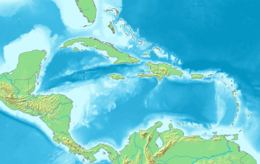Quita Sueño Bank
 Landsat image of Quita Sueño Bank | |
| Geography | |
|---|---|
| Location | Caribbean Sea |
| Coordinates | 14°19′N 81°10′W / 14.317°N 81.167°W |
| Administration | |
Quita Sueño Bank (claimed as Quitasueño) is a reef formation of Colombia which was once claimed by the United States, located 110 km north-northeast of Providencia Island.
History
[edit]In 1869, James Jennett claimed the bank for the United States under the Guano Islands Act of 1856. In 1972, the United States and Colombia signed a treaty (ratified in 1981) that abandoned the U.S. claim to the reef. Unlike some islands included in the treaty ceded to Colombia, the United States regarded Quita Sueño Bank as having no emergent land and thus ineligible for the basis of a sovereignty claim. Rather than being ceded to any particular nation, the claim was simply abandoned, and American fishing rights were retained.[1] Colombia, which had also made previous claims on the reef, considers the bank to be a part of its San Andres and Providencia Department.
In the northern part of the eastern reef is Quita Sueño Light.[2] The location is named Cayo Quitasueño on the official nautical chart at 14°28′57.2298″N 81°7′39.7632″W / 14.482563833°N 81.127712000°W, but no emergent land is indicated around the lighthouse.[3] The light is erected on top of a square platform.[4] This lighthouse had originally been established by the United States in 1919. The current structure is from 1977. It is now called Faro Quitasueño Norte since in 2008, a second lighthouse Faro Quitasueño Sur was established in the southern part of the reef at 14°09′17″N 81°9′40″W / 14.15472°N 81.16111°W.[5]
Nicaragua also had a claim to the bank. On November 19, 2012, the International Court of Justice in The Hague ruled the bank is a part of Colombia.[6] The ICJ found that only one of the 54 features identified by Nicaragua in Quitasueño is an island at high tide and thus eligible for a sovereignty claim.[7][8]
See also
[edit]References
[edit]- ^ (in Spanish) Treaty of exchange between Colombia and the United States, 1972 Archived 2011-05-24 at the Wayback Machine
- ^ American Maritime Cases. Volume 3. 1976. pages 2562-2564.
- ^ Official Nautical Chart: Cayo Quitasueño
- ^ Fotos: Cayo Quitasueño, un paraíso perdido de Colombia
- ^ Rowlett, Russ. "Lighthouses of San Andrés and Providencia". The Lighthouse Directory. University of North Carolina at Chapel Hill.
- ^ Fox News Latino, World court rules for Colombia in dispute over Caribbean isles, 19 Nov 2012
- ^ Bekker, Pieter (15 January 2013). "The World Court Awards Sovereignty Over Several Islands in the Caribbean Sea to Colombia and Fixes a Single Maritime Boundary between Colombia and Nicaragua" (PDF). Insight (American Society of International Law). 17 (3). Archived from the original (PDF) on 21 July 2013. Retrieved 2013-08-12.
- ^ Colombia salva los cayos pero Nicaragua gana mar territorial. 19 Nov 2012. Urgente24.
- Caribbean islands claimed under the Guano Islands Act
- Former regions and territories of the United States
- International territorial disputes of the United States
- Territorial disputes of Colombia
- Territorial disputes of Nicaragua
- Islands of the Archipelago of San Andrés, Providencia and Santa Catalina
- Reefs of Colombia
- Caribbean islands of Colombia
- Former disputed islands


